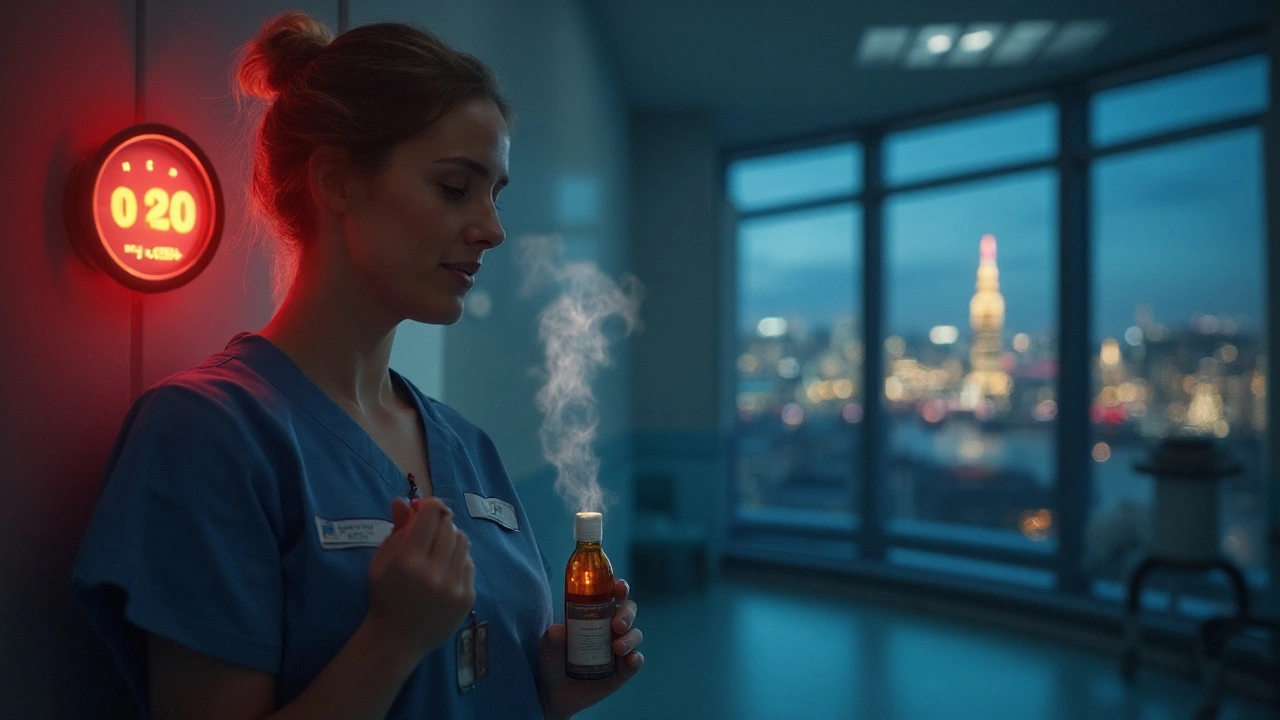
Shift Medication Timing Calculator
Pharmaceutical advice for shift workers and night owls is a set of medication‑based recommendations aimed at mitigating circadian misalignment in people who work non‑standard hours. Whether you’re pulling the 2am graveyard shift, rotating between day and night, or simply a self‑identified night owl, the body’s internal clock can get out of sync, leading to fatigue, mood swings, and long‑term health risks. This guide breaks down the science, the most common drugs, timing tricks, and the lifestyle tweaks that make pharmaceutical help work better.
Why Circadian Disruption Matters
Shift work throws the circadian rhythm is a 24‑hour physiological cycle that regulates sleep, hormone release, and metabolism off its usual schedule. When the rhythm is misaligned, the body experiences shift work sleep disorder, a condition recognized by the International Classification of Sleep Disorders. Studies from the American Academy of Sleep Medicine show that up to 30% of rotating‑shift employees meet the diagnostic criteria, and they face higher rates of cardiovascular disease, type‑2 diabetes, and mental‑health issues.
Two key factors drive the problem: chronotype is a individual’s natural preference for activity timing (whether you’re a “lark” or an “owl”) and the exposure to light at odd hours, which suppresses melatonin is a hormone that signals darkness to the brain production.
Core Pharmaceutical Options
When lifestyle tweaks aren’t enough, targeted drugs can help reset the internal clock or keep you alert during odd hours. Below are the most widely used agents, their typical doses, onset, duration, and pros/cons for shift workers.
| Medication | Typical Dose | Onset | Duration | Key Benefit for Shift Workers |
|---|---|---|---|---|
| Melatonin is a synthetic hormone supplement | 0.5-5mg, 30min before desired sleep | 30min | 4-8h | Facilitates faster sleep onset on daytime naps |
| Modafinil is a wake‑promoting agent | 200mg oral, once daily | 1h | 12-15h | Improves alertness during night shifts without severe rebound sleepiness |
| Caffeine is a stimulant found in coffee, tea, and pills | 100-200mg, 30min before work | 15min | 3-5h | Quick boost for short, intense tasks; easy to dose |
| Zolpidem is a short‑acting hypnotic | 5-10mg, right before sleep | 15min | 2-3h | Helps secure uninterrupted sleep during brief daytime windows |
How to Time Your Medications (Chronopharmacology)
Timing matters as much as the drug itself. Chronopharmacology is a field studying how biological rhythms influence drug effects suggests three rules for shift workers:
- Take melatonin at the *start* of your intended sleep block, not just before you lie down.
- Schedule Modafinil *at the beginning* of the night shift to avoid residual insomnia.
- Limit caffeine to the *first half* of the night shift; a later dose can push the sleep window too far.
Because many of these drugs are metabolized by the CYP450 enzyme system is a group of liver enzymes that process pharmaceuticals, beware of interactions. For example, certain anti‑depressants (e.g., fluoxetine) inhibit CYP2C19, raising Modafinil plasma levels and increasing side‑effects.

Non‑Drug Allies That Boost Medication Effectiveness
Pharmaceuticals work best when paired with environmental and behavioral strategies.
- Light therapy is a bright‑light exposure method that shifts circadian phase - use a 10,000‑lux box for 30min at the *start* of your night shift to signal alertness.
- Maintain strict sleep hygiene is a set of habits that promote restorative sleep: blackout curtains, white‑noise, cool room (18‑20°C).
- Watch for vitamin D deficiency is a common issue in night‑shift workers due to limited sunlight exposure. Supplement 1000-2000IU daily if serum levels are below 30ng/mL.
- Consider a low‑dose buspirone is a non‑sedating anxiolytic for night‑shift anxiety that does not interfere with alertness.
Practical Checklist for the Night‑Shift Pharmacist
Before you pop a pill, run through this quick list:
- Identify your primary problem: difficulty falling asleep, staying awake, or both.
- Choose the drug that matches the problem (melatonin for sleep onset, Modafinil for wakefulness).
- Confirm dosing time based on the rules in the chronopharmacology section.
- Check for drug‑drug interactions, especially with CYP450 substrates.
- Pair the medication with at least one non‑drug strategy (light therapy, sleep hygiene).
- Track outcomes for one week: sleep latency, total sleep time, alertness scores (e.g., Karolinska Sleepiness Scale).
- Adjust dose or timing if side‑effects emerge; consult an occupational health physician if problems persist.
When to Seek Professional Help
Self‑management works for many, but you should see a clinician if you experience any of the following:
- Persistent insomnia longer than 3weeks despite medication.
- Excessive daytime sleepiness causing safety concerns (e.g., driving, operating machinery).
- Severe mood changes, depression, or anxiety that interfere with work.
- Signs of medication misuse, such as tolerance to Modafinil or dependence on high‑dose caffeine.
An occupational health specialist can order a sleep study, review your medication regimen, and suggest workplace adjustments (e.g., rotating shift designs, scheduled rest breaks).
Frequently Asked Questions
Can I take melatonin every day?
Melatonin is generally safe for nightly use at low doses (0.5-3mg). Higher doses may cause residual grogginess. Always discuss long‑term use with a health professional, especially if you take other sedatives.
Is Modafinil legal for shift‑work without a prescription?
No. Modafinil is a prescription‑only medication in most countries, classified as a Schedule IV drug. Using it without a doctor’s order can lead to legal and health risks.
How much caffeine is too much for a night shift?
Most guidelines advise no more than 400mg per 24hours for healthy adults. For night‑shift workers, keep intake under 200mg after the first half of the shift to avoid insomnia.
Can light therapy replace medication?
Light therapy can significantly shift circadian phase and improve alertness, but it may not fully address severe insomnia or excessive sleepiness. Often it works best when combined with low‑dose melatonin or Modafinil.
What role does vitamin D play for night owls?
Vitamin D supports immune function and mood regulation. Night‑shift workers frequently have low serum levels due to limited sunlight, increasing risk of fatigue and depression. Supplementation can improve overall well‑being.
Are there any over‑the‑counter options for staying awake?
Common OTC choices include caffeine pills and certain herbal stimulants like guarana. Their effectiveness is modest compared to prescription agents, and they can cause jitteriness if taken late in the shift.
